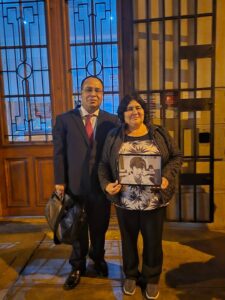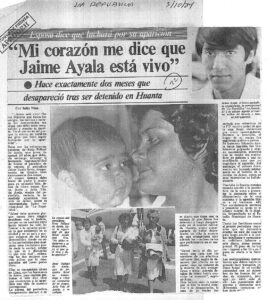In a trial that lasted more than two years, on Sept. 30 a Peruvian court sentenced former military officer Alberto Rivero Valdeavellano to 18 years in prison for the forced disappearance of journalist Jaime Ayala Sulca, which was carried out by those under his command in Ayacucho 40 years ago.
The crime against Ayala is part of the Huanta 84 Case, which also includes the murders of six members of the Evangelical Presbyterian Church of Callqui and the discovery of 50 bodies in the Pucayacu graves. All of these crimes occurred in 1984, one of the most violent times of the internal conflict in Peru.
Judge Miluska Cano, who presides over the Fourth National Criminal Chamber for Temporary Liquidation of the National Specialized Criminal Court, also ordered that 100,000 soles (about US $27,000) be compensated for each of the victims' direct relatives. The ruling also established comprehensive reparation measures for care through the State, such as psychological and medical care for the direct relatives of the victims. Finally, it was established that the State offer a public apology for “the serious mistake to which they subjected the injured parties and their families by unfairly considering them terrorist elements,” according to the ruling.

El abogado Juan José Quispe junto a Rosa Pallqui, la noche en que se conoció la sentencia en el caso de la desaparición forzada del periodista Jaime Ayala Sulca. (Foto: Tomada de la página de Facebook Justicia para Jaime Ayala Sulca)
“I receive this sentence as a historic sentence because after 40 years justice was achieved,” Rosa Luz Pallqui, the journalist's wife, told LatAm Journalism Review (LJR).
Although the public prosecutor’s office requested a sentence of 25 years, Juan José Quispe, lawyer for the journalist's family, said the sentence is relevant since it achieves the conviction of "one of the highest authorities of the Navy in Huanta in 1984,” he told LJR. The lawyer said that, because it is a conviction for crimes against humanity, he does not enjoy any prison benefits, nor exception, nor pardon.
However, authorities must first locate Rivero Valdeavellano, who has been a fugitive since the sentence was announced, according to Quispe. The hearings, the lawyer said, were held virtually, and on the day of the sentencing, the accused turned off the camera and “went underground.”
Ayala Sulca, 22, had a journalistic program on Radio Huanta 2000 and was a correspondent for the newspaper La República. He covered topics ranging from the violence of the Shining Path guerrillas to complaints about cases of torture, disappearances, executions, and illegal detentions committed by members of the Navy in Huanta.
On Aug. 2, 1984, Ayala Sulca went to the Naval Infantry Headquarters located in the Huanta Municipal Stadium to file a complaint for a raid on his mother's home the previous day and for the beating of his brother by members of the military. Several witnesses who spoke with the public prosecutor’s office and the Truth and Reconciliation Commission said they saw the journalist enter the stadium, but never saw him leave.
For Quispe, it is also important that the sentence comes in time for the commemoration of Day of the Journalist in Peru [Oct. 1] because it recognizes that the motive for the journalist's disappearance had to do with his work.
“They [members of the Navy] were looking for him to arrest him because in his capacity as a journalist, a correspondent for the newspaper La República, he made journalistic reports, which were an obstacle to the policy of the counter-subversive struggle the military established in the area,” the judge said during the reading of the sentence.
Quispe also highlighted that the sentence determined that none of the victims had links to the Shining Path, despite accusations by various members of the military after the crimes were committed.
“It's important because there is always that stigma,” Quispe said. “The Court said that, instead, what they [the Navy] have done is detain, disappear and execute Quechua-speaking people, of humble status, for the simple suspicion of belonging to this terrorist organization or collaborating with them, as a systematic and widespread policy of the Navy in Huanta in 1984.”

Varios medios cubrieron la desaparición del periodista Jaime Ayala. Desde el primer día, su esposa Rosa Luz Pallqui luchó por la verdad y justicia. En la imagen, un artículo que apareció en el periódico La República. (Ministerio de Cultura - Centro de Documentación e Investigación)
Also on trial as part of the Huanta 84 case was Augusto Gabilondo García del Barco, former head of the Huanta counter-subversive base. However, the judge decided to reserve his trial because he is not in Peru. Authorities presume he is in Spain awaiting extradition proceedings.
“It seems bad to me. I was waiting for the sentencing of the two defendants,” Pallqui said.
Another aspect that Quispe and Pallqui highlighted was the non-application of the so-called 'Impunity Law,' which had been requested by García del Barco. The law, enacted by Congress on Aug. 9, allows for the establishment of a statute of limitations for crimes against humanity committed before July 1, 2002, by terrorist and military groups.
In the ruling, the judge determined, among other provisions, that cases related to human rights violations must be analyzed following the American Convention on Human Rights or decisions of the Inter-American Court of Human Rights, whose jurisdiction Peru has recognized since 1981.
“[The judge] said that crimes considered against humanity, like this case, are imprescriptible in nature,” Quispe said.
“That is very important because it sets a precedent for other cases,” Pallqui said.
Although she and her son Boris, who was four months old when his father disappeared, highlight the decision, they consider the search for his body vital.
“We hope that the office that searches for missing persons will continue looking for him until he is found so we can give him a Christian burial,” Pallqui said.